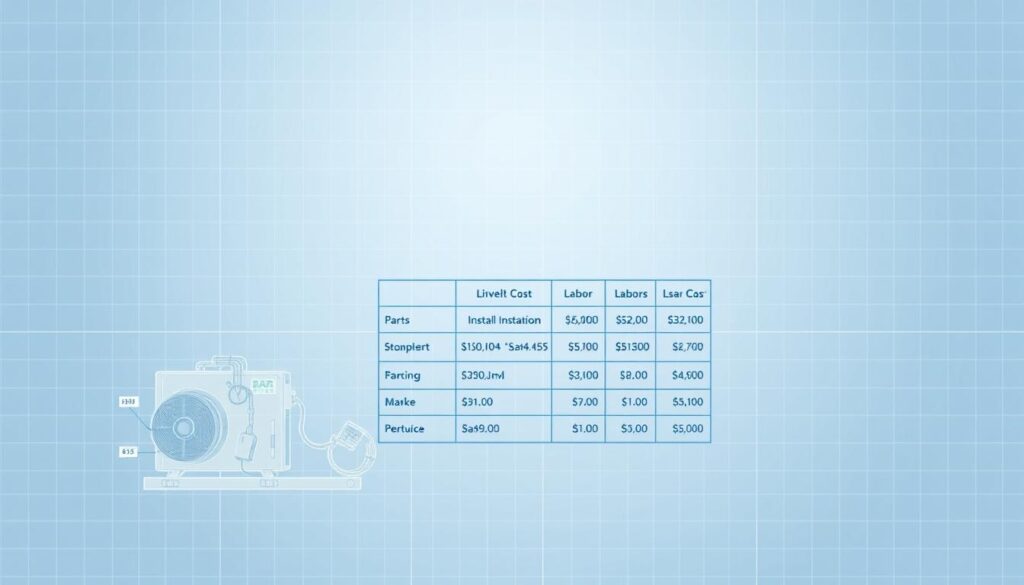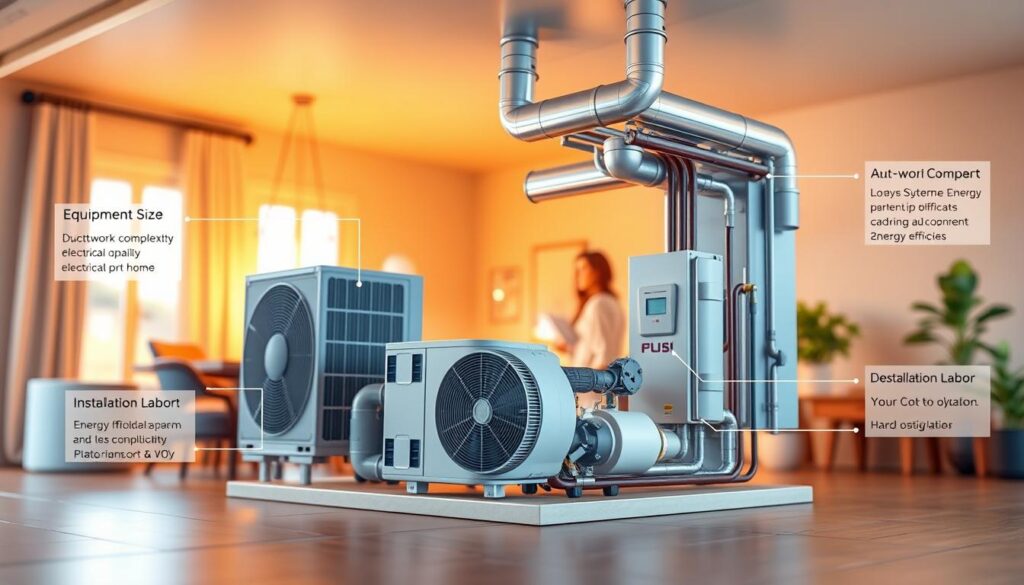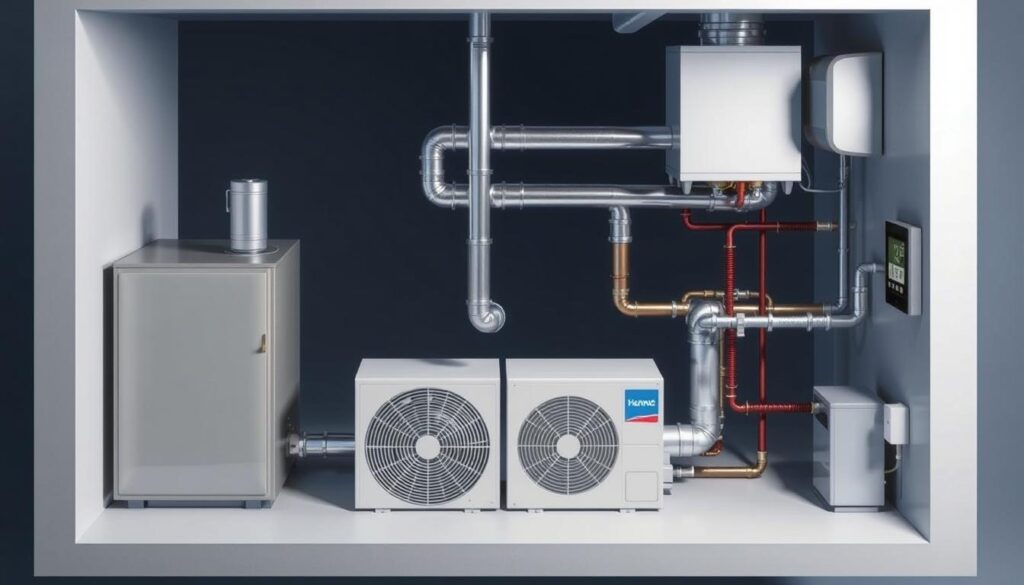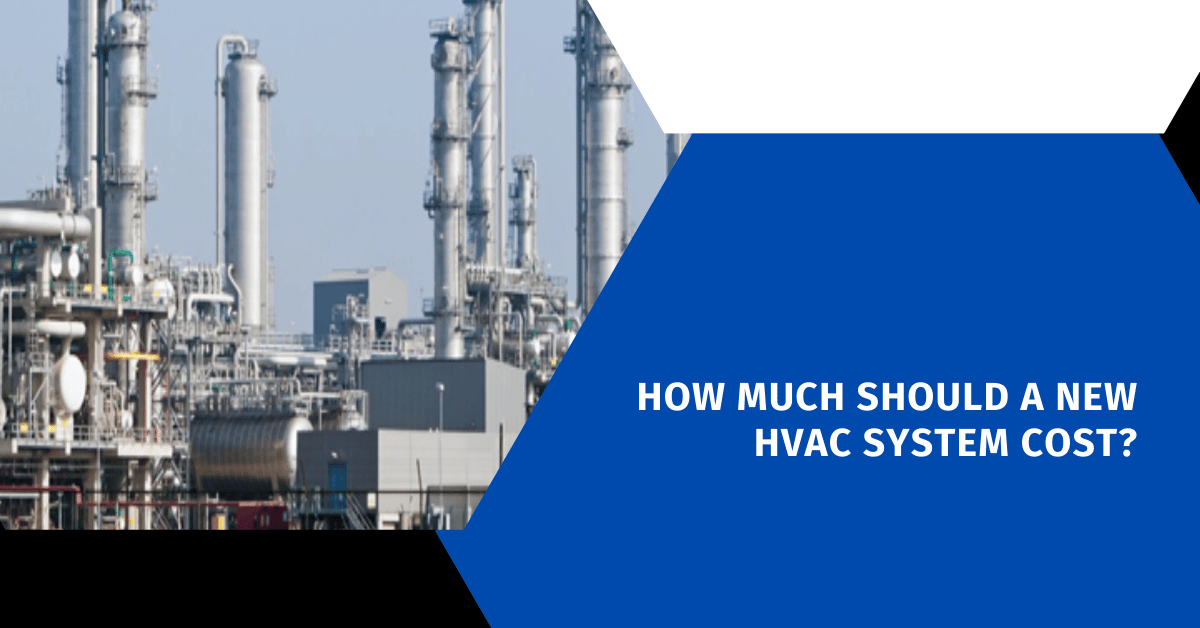Affiliate Disclosure
HVAC Guide Guys is a participant in the Amazon Services LLC Associates Program, an affiliate advertising program designed to provide a means for sites to earn advertising fees by advertising and linking to Amazon.
How Much Should a New HVAC System Cost? Replacing your HVAC system in 2025 might cost between $5,000 and $11,000 for a basic setup. The cost depends on several factors that can change your total spending.

Are you curious about the cost of a new HVAC system? Figuring out the cost of heating and cooling your home can be tricky. Many homeowners find it hard to understand.
Your home’s size, needs, and energy goals are key in setting your budget. Every home is different, with its own heating and cooling challenges and opportunities.
Key Takeaways
- Average HVAC system replacement costs range from $5,000 to $11,000
- Multiple factors impact the total hvac system cost estimate
- Home size and system complexity affect pricing
- Energy efficiency can influence long-term expenses
- Professional assessment is key for accurate pricing
Table of Contents
Understanding HVAC System Cost Ranges
Finding the right HVAC system can be tough. Your home’s comfort depends on it. Knowing the costs helps you make a smart choice.
Many things affect the cost of your HVAC system. Homeowners need to think about a few key points:
- Home square footage
- System efficiency rating
- Equipment quality
- Installation complexity
Average Cost by Home Size
Your home’s size matters when it comes to HVAC costs. Smaller homes need less expensive systems. Larger homes need more powerful ones. Here’s a rough guide:
- 1,000-1,500 sq ft homes: $6,000 – $10,000
- 1,500-2,500 sq ft homes: $10,000 – $15,000
- 2,500-3,500 sq ft homes: $15,000 – $20,000
Basic vs Premium System Costs
There are two main types of HVAC systems: basic and premium. Basic systems are cheaper but less efficient. Premium systems cost more but save energy and have more features.
Labor and Installation Price Factors
Installation costs are a big part of the total cost. Things like ductwork, home layout, and local labor rates affect the price. Getting it installed by a pro ensures it works well and lasts long.
Pro tip: Always get multiple quotes and compare system specifications before making a final decision.
Explore Our HVAC Shop
Looking for top-rated HVAC tools, parts, and accessories? Visit our shop and find the perfect solution for your needs.
Visit the ShopHVAC System Types and Their Price Points
When you’re looking at a new HVAC system, knowing the different types and their costs is key. The cost to install varies a lot based on the system you pick.
Choosing the right HVAC system is important for your home’s comfort and energy use. Let’s look at the most common ones:
- Central Air Conditioning Systems
Great for cooling your whole house, these systems cost between $3,000 and $7,000. They keep the temperature even and are best for bigger homes.
- Heat Pump Systems
These units can both heat and cool your home, costing between $4,000 and $8,000. They’re very efficient in mild climates.
- Furnace Systems
Traditional heating options, costing from $2,500 to $6,000. Gas furnaces are often cheaper and more efficient in cold areas.
An hvac cost calculator can give you a better idea of what you’ll spend. It takes into account your home’s size and the system you want.
| System Type | Average Cost | Typical Lifespan |
|---|---|---|
| Central Air Conditioner | $3,000 – $7,000 | 10-15 years |
| Heat Pump | $4,000 – $8,000 | 10-15 years |
| Gas Furnace | $2,500 – $6,000 | 15-20 years |
Remember, the upfront cost is just part of the deal. Think about energy efficiency, upkeep, and how well it will last over time. These are all important when picking your home’s heating and cooling system.
How Much Should a New HVAC System Cost?
Getting a new HVAC system is more than just the upfront cost. Homeowners must think about other parts and expenses that add up. This affects the overall cost of affordable hvac system prices.
When looking for the best hvac system deals, it’s important to break down costs into several areas:
Cost Breakdown for Different Components
Your HVAC system has many important parts that affect the total price:
- Outdoor condensing unit
- Indoor air handler
- Ductwork modifications
- Thermostat and control systems
Additional Installation Expenses
Installation costs can also vary a lot. HVAC technicians usually charge between $50-$100 per hour for their work.
| Installation Component | Estimated Cost Range |
|---|---|
| Labor | $1,500 – $3,000 |
| Equipment | $3,000 – $7,000 |
| Additional Materials | $500 – $1,500 |
Permit and Inspection Fees
Remember, there are local requirements too. HVAC installation permits usually cost between $250 to $400. These fees make sure your system is safe and meets local standards.
Pro tip: Always check with local authorities about specific permit requirements to avoid unexpected expenses.
Planning your budget for a new HVAC system is key. While it might seem expensive, a good system can save you money in the long run. It also makes your home more comfortable.
Factors Affecting HVAC Installation Costs

Knowing what affects your HVAC system cost is key for homeowners. Your specific costs can change a lot based on different factors.
How big your home is matters a lot. Bigger homes need stronger systems to keep the temperature right. HVAC experts will figure out the right size for your home’s size.
- Home square footage
- Existing ductwork condition
- local climate considerations
- Energy efficiency requirements
The state of your ductwork affects costs. Old ductwork might need to be replaced, raising your total cost. Homes with unique designs might need special ductwork, adding to the cost.
Climate is also important. Places with very hot or cold weather need stronger systems. This means higher costs. Your area’s weather will decide what system you need.
Energy efficiency is another big factor. Systems that save energy cost more at first but save money later. Talking to a pro can help you find a balance between cost and savings.
Pro tip: Always get multiple quotes and carefully evaluate the specific hvac installation cost factors unique to your home.
Explore Our HVAC Shop
Looking for top-rated HVAC tools, parts, and accessories? Visit our shop and find the perfect solution for your needs.
Visit the ShopEnergy Efficiency Ratings and Cost Impact
Understanding energy efficiency is key when looking at your hvac system pricing guide. Modern HVAC systems can save you money in the long run. They use new technologies to be more efficient.
When you use an hvac cost calculator, energy efficiency is very important. It helps figure out how much you’ll spend and how much you can save. Systems that use more energy cost more to run.
SEER Ratings Explained
SEER (Seasonal Energy Efficiency Ratio) shows how well an air conditioner works. The newest SEER2 ratings are between 13.4 and 23.6. This is a big jump from older models that scored 8-10.
- Lower SEER ratings mean less efficient systems
- Higher SEER ratings mean more energy savings
- SEER2 provides more accurate real-world performance measurements
Long-Term Savings
Choosing a high-efficiency HVAC system can save you a lot of money. A system with a higher SEER rating might cost more at first but can save you hundreds of dollars a year on energy.
When picking your new HVAC system, think about the long-term savings. A more efficient system might cost more to buy. But it can save you money every year for its whole life.
Size Considerations and Price Variations

When looking at the cost of a new HVAC system, your home’s size is key. The size of your home affects the type and size of the system you need. This, in turn, impacts the overall cost of installation.
Different home sizes need different HVAC system sizes for best performance and energy use. Here’s a look at what’s usually needed:
- Small homes (1,200-1,500 sq. ft): 2-3 ton system
- Medium homes (1,500-2,500 sq. ft): 3-4 ton system
- Large homes (2,500-3,500 sq. ft): 4-5 ton system
Choosing the right size is very important. A system that’s too small won’t cool or heat your home well. On the other hand, a system that’s too big wastes energy and costs more to install.
| Home Size | System Capacity | Estimated Cost Range |
|---|---|---|
| 1,200-1,500 sq. ft | 2-3 ton | $3,500 – $5,500 |
| 1,500-2,500 sq. ft | 3-4 ton | $5,500 – $8,000 |
| 2,500-3,500 sq. ft | 4-5 ton | $8,000 – $12,000 |
“Proper HVAC sizing is an investment in home comfort and energy efficiency.” – HVAC Industry Expert
Professional HVAC contractors do detailed calculations. They consider things like insulation, window quality, and local climate. This helps them find the best system size for your home.
Brand Differences and Their Price Points
When you’re looking for an HVAC system, knowing about different brands is key. It helps you find the best deals and understand the costs. Each brand offers something special that can affect your comfort and wallet.
Choosing the right HVAC brand is important. You need to think about how well it works, how reliable it is, and how much it costs.
Premium vs Economy Brands
Premium brands like Trane, Carrier, and Lennox have a lot to offer:
- They use energy more efficiently
- They have the latest technology
- They are built to last
- They last longer
Economy brands, such as Goodman and Armstrong, are more affordable. They offer good performance without breaking the bank.
| Brand Category | Average Cost Range | Typical Warranty |
|---|---|---|
| Premium Brands | $6,000 – $12,000 | 10-12 years |
| Economy Brands | $3,500 – $7,000 | 5-7 years |
Warranty Coverage Comparison
Warranty differences are big between premium and economy brands. Premium brands usually offer better coverage. This might make their higher prices worth it.
What you need, how much you can spend, and how you plan to use your HVAC system matter. Do your homework and talk to HVAC experts to choose wisely.
Ductwork Requirements and Associated Costs
Ductwork is key when you’re figuring out the cost of an HVAC system. The state of your current ductwork can greatly affect both the system’s performance and your budget. If your ducts are not well-maintained, they can cut your system’s efficiency by up to 30%. This can lead to higher energy bills and less comfort.
When assessing ductwork, there are several important factors to consider:
- Current duct condition and age
- Proper sizing and insulation
- Sealing and air leakage prevention
- Material quality and complexity of installation
The cost of ductwork can vary a lot, depending on your home’s needs. HVAC experts usually suggest a thorough duct check before installing to spot any problems.
| Ductwork Condition | Estimated Cost Range | Potential Impact |
|---|---|---|
| Minor Repairs | $500 – $1,500 | Small efficiency improvements |
| Partial Replacement | $1,500 – $3,500 | Moderate system performance boost |
| Full Ductwork Replacement | $3,500 – $7,000 | Significant efficiency and comfort enhancement |
Pro tip: Invest in professional ductwork evaluation to prevent unexpected expenses and maximize your HVAC system’s long-term performance.
Seasonal Pricing and Cost-Saving Opportunities
Buying an HVAC system at the right time can save you money. Homeowners who look for deals know when to buy. The best times are spring and fall, when prices are lower.
“Purchasing an HVAC system during off-peak seasons can save you up to 20% on installation costs.”
To find the best deals, consider these tips:
- Spring: Mild weather means less need for HVAC services
- Fall: Contractors offer discounts to keep busy
- Stay away from summer and winter, when prices go up
Manufacturers and contractors often have special deals in these slow times. To save more, try these:
- Get quotes from several providers
- Look for rebates from manufacturers
- Check for tax credits for energy-efficient systems
| Season | Average Savings | Deal Availability |
|---|---|---|
| Spring | 15-25% | High |
| Fall | 10-20% | Moderate |
| Summer/Winter | 0-5% | Low |
Pro tip: Always schedule consultations and request written estimates to compare affordable hvac system prices effectively.
Explore Our HVAC Shop
Looking for top-rated HVAC tools, parts, and accessories? Visit our shop and find the perfect solution for your needs.
Visit the ShopInstallation Quality and Long-Term Value
Looking at your hvac system pricing guide? It’s key to understand the importance of installation quality. Choosing the right contractor can greatly affect your costs and system performance.
Professional installation is more than just putting equipment in place. It ensures:
- Optimal system efficiency
- Reduced energy consumption
- Extended equipment lifespan
- Minimized repair costs
The value of your HVAC system over time depends on the installation team’s skill. Saving money by cutting corners can lead to:
- Higher energy bills
- More system breakdowns
- Sooner equipment failure
- Potential safety hazards
It’s vital to invest in skilled, licensed professionals who know HVAC systems well. Look for contractors with:
| Credential | Importance |
|---|---|
| NATE Certification | Shows technical skill |
| State Licensing | Guarantees legal standing |
| Manufacturer Training | Knows specialized equipment |
Even a bit more for installation upfront can save you a lot in the long run. It leads to better performance and savings over your HVAC system’s life.
Conclusion
Figuring out the cost of a new HVAC system involves looking at several factors. Your home’s comfort and energy use depend on picking the right system. This system should balance initial costs with long-term benefits.
The “$5,000 rule” is a useful guide when deciding to fix or replace your system. Multiply your system’s age by the repair cost. If it’s over $5,000, it’s usually better to replace it. This avoids future repair costs and gets you modern, energy-saving tech.
Your HVAC choice should focus on efficiency, reliability, and saving energy. Look into different brands, understand installation needs, and think about your home’s unique requirements. Getting advice from pros can help you find the best fit for your budget and comfort needs.
Choosing the right HVAC system is about more than just the upfront cost. It’s about making your home comfortable and energy-efficient for years. Take your time to consider all options and seek expert advice to get the most out of your investment.
FAQ
What is the average cost of a new HVAC system?
How do I know what size HVAC system I need for my home?
What are the most cost-effective HVAC system types?
How much do installation costs typically add to the total HVAC system price?
What is the average cost of a new HVAC system?
How do I know what size HVAC system I need for my home?
What are the most cost-effective HVAC system types?
How much do installation costs typically add to the total HVAC system price?
FAQ
What is the average cost of a new HVAC system?
A new HVAC system costs between ,000 and ,000. This price varies based on your home’s size, the type of system, and how complex the installation is. Your home’s square footage, the system’s efficiency, and your local climate also play a big role in the final cost.
How do I know what size HVAC system I need for my home?
Knowing the right size for your HVAC system is key. You’ll need about 20 BTUs for each square foot of your home. A professional can do a detailed calculation to find the perfect size for your home. This ensures your system works efficiently and keeps you comfortable.
What are the most cost-effective HVAC system types?
Heat pumps are often the most cost-effective choice. They handle both heating and cooling. Another good option is central air conditioning paired with a high-efficiency gas furnace. This combo balances initial costs with long-term energy savings.
How much do installation costs typically add to the total HVAC system price?
Installation costs usually make up 20-30% of the total price. This can be between
FAQ
What is the average cost of a new HVAC system?
A new HVAC system costs between $5,000 and $12,000. This price varies based on your home’s size, the type of system, and how complex the installation is. Your home’s square footage, the system’s efficiency, and your local climate also play a big role in the final cost.
How do I know what size HVAC system I need for my home?
Knowing the right size for your HVAC system is key. You’ll need about 20 BTUs for each square foot of your home. A professional can do a detailed calculation to find the perfect size for your home. This ensures your system works efficiently and keeps you comfortable.
What are the most cost-effective HVAC system types?
Heat pumps are often the most cost-effective choice. They handle both heating and cooling. Another good option is central air conditioning paired with a high-efficiency gas furnace. This combo balances initial costs with long-term energy savings.
How much do installation costs typically add to the total HVAC system price?
Installation costs usually make up 20-30% of the total price. This can be between $1,000 and $3,000. The cost depends on the installation’s complexity, any ductwork changes, and local labor rates.
What factors most significantly impact HVAC system costs?
Several factors greatly affect the cost of an HVAC system. These include your home’s size, the system’s efficiency (SEER rating), the brand, the type of system, and your local climate. Also, any ductwork changes can impact the price. Efficiency and installation complexity are key factors.
How can I save money on a new HVAC system?
To save, buy during off-peak seasons and look for rebates from manufacturers. Check for energy efficiency tax credits and get quotes from different contractors. Choosing a mid-tier efficiency system can balance upfront costs with long-term savings.
How long does a typical HVAC system last?
Most HVAC systems last 10-15 years with regular maintenance. High-quality systems from trusted brands can last up to 20 years. Regular service and maintenance by professionals are key to a long lifespan.
Are there financing options available for HVAC system replacements?
Yes, many HVAC companies offer financing. This includes manufacturer financing, personal loans, and home equity lines of credit. Some utility companies also offer financing for energy-efficient upgrades with good terms.
How important are energy efficiency ratings when choosing an HVAC system?
Energy efficiency ratings are very important. A higher SEER rating means lower energy costs over time. While high-efficiency systems cost more upfront, they save you money on bills in the long run.
What should I consider about ductwork when replacing my HVAC system?
The condition of your ductwork is very important. Leaky or poorly designed ducts can cut system efficiency by up to 20%. It’s wise to have a professional inspect your ductwork. Budget for any repairs or replacements needed to ensure your system works well.
,000 and ,000. The cost depends on the installation’s complexity, any ductwork changes, and local labor rates.
What factors most significantly impact HVAC system costs?
Several factors greatly affect the cost of an HVAC system. These include your home’s size, the system’s efficiency (SEER rating), the brand, the type of system, and your local climate. Also, any ductwork changes can impact the price. Efficiency and installation complexity are key factors.
How can I save money on a new HVAC system?
To save, buy during off-peak seasons and look for rebates from manufacturers. Check for energy efficiency tax credits and get quotes from different contractors. Choosing a mid-tier efficiency system can balance upfront costs with long-term savings.
How long does a typical HVAC system last?
Most HVAC systems last 10-15 years with regular maintenance. High-quality systems from trusted brands can last up to 20 years. Regular service and maintenance by professionals are key to a long lifespan.
Are there financing options available for HVAC system replacements?
Yes, many HVAC companies offer financing. This includes manufacturer financing, personal loans, and home equity lines of credit. Some utility companies also offer financing for energy-efficient upgrades with good terms.
How important are energy efficiency ratings when choosing an HVAC system?
Energy efficiency ratings are very important. A higher SEER rating means lower energy costs over time. While high-efficiency systems cost more upfront, they save you money on bills in the long run.
What should I consider about ductwork when replacing my HVAC system?
The condition of your ductwork is very important. Leaky or poorly designed ducts can cut system efficiency by up to 20%. It’s wise to have a professional inspect your ductwork. Budget for any repairs or replacements needed to ensure your system works well.

